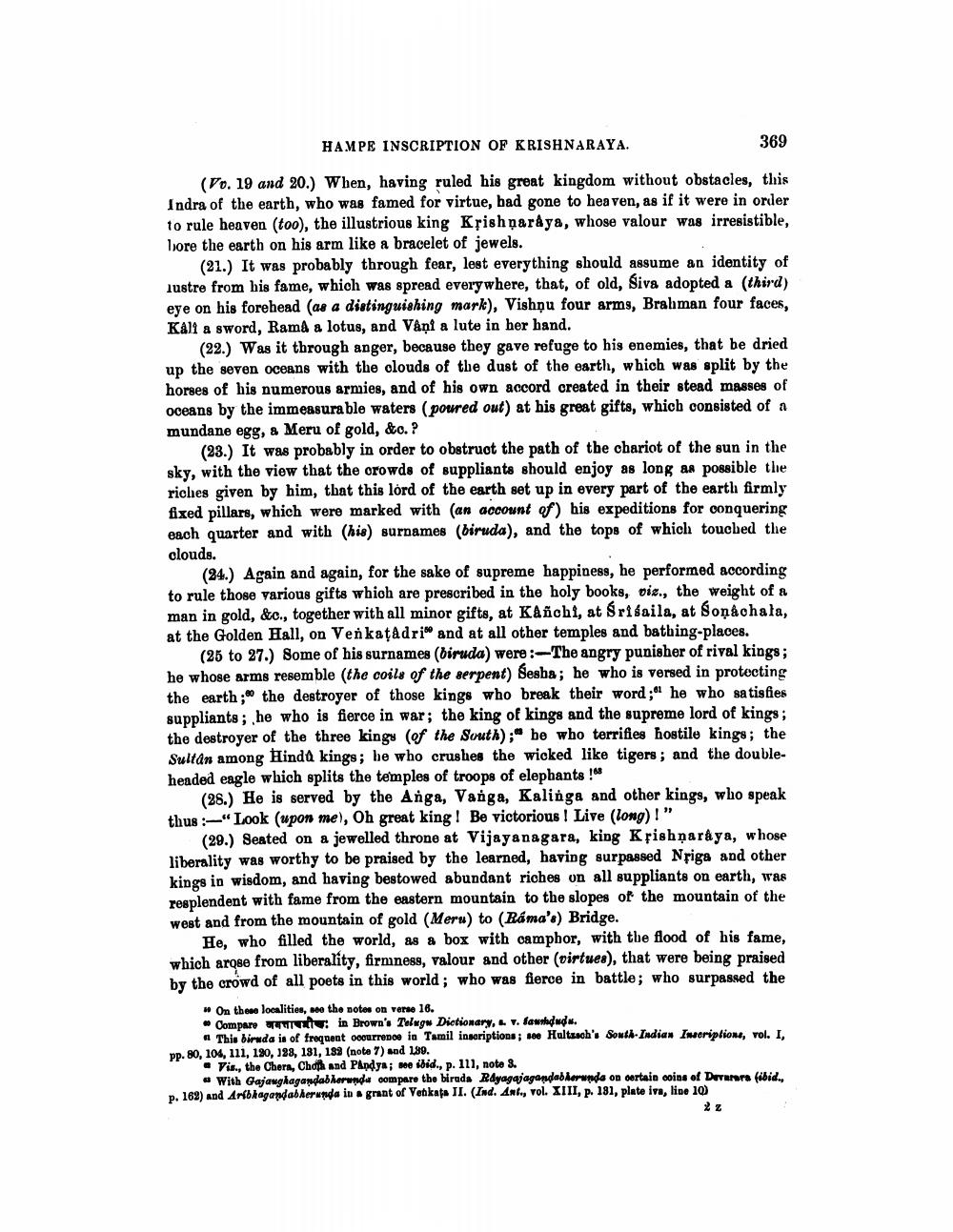________________
HAMPE INSCRIPTION OF KRISHNARAYA.
369
(Vo. 19 and 20.) When, having ruled his great kingdom without obstacles, this Indra of the earth, who was famed for virtue, had gone to heaven, as if it were in order to rule heaven (too), the illustrious king Kệishṇaraya, whose valour was irresistible, lore the earth on his arm like a bracelet of jewels.
(21.) It was probably through fear, lest everything should assume an identity of lustre from his fame, which was spread everywhere, that, of old, Siva adopted a (third) eye on his forehead (as a distinguishing mark), Vishņu four arms, Brahman four faces, Kált a sword, Ramá a lotus, and Vani a lute in her hand.
(22.) Was it through anger, because they gave refuge to his enemies, that be dried up the seven oceans with the clouds of the dust of the earth, which was split by the horses of his numerous armies, and of his own accord created in their stead masses of oceans by the immeasurable waters (poured out) at his great gifts, which consisted of a mundane egg, a Meru of gold, &c. ?
(23.) It was probably in order to obstruct the path of the chariot of the sun in the sky, with the view that the crowds of suppliants should enjoy as long as possible the riches given by him, that this lord of the earth set up in every part of the earth firmly fixed pillars, which were marked with an account of his expeditions for conquering each quarter and with his) surnames (hiruda), and the tops of which touched the clouds.
(24.) Again and again, for the sake of supreme happiness, he performed according to rule those various gifts which are prescribed in the holy books, vie., the weight of a man in gold, &c., together with all minor gifts, at Kanchi, at Srisaila, at Soñachala, at the Golden Hall, on Venkatadri and at all other temples and bathing-places.
(25 to 27.) Some of his surnames (biruda) were :-The angry punisher of rival kings; he whose arms resemble (the coils of the serpent) Sesba; he who is versed in protecting the earth; the destroyer of those kings who break their word ; he who satisfies suppliants; he who is fierce in war; the king of kings and the supreme lord of kings; the destroyer of the three kings (of the South);" be who terrifies hostile kings; the Sultan among Hind kings; he who crushes the wicked like tigers; and the doubleheaded eagle which splits the temples of troops of elephants !
(28.) He is served by the Anga, Vanga, Kalinga and other kings, who speak thus :-"Look (upon me), Oh great king! Be victorious ! Live (long) !"
(29.) Seated on a jewelled throne at Vijayanagara, king Krishộaråya, whose liberality was worthy to be praised by the learned, having surpassed Nriga and other kings in wisdom, and having bestowed abundant riches on all suppliants on earth, was resplendent with fame from the eastern mountain to the slopes of the mountain of the west and from the mountain of gold (Meru) to (Rama's) Bridge.
He, who filled the world, as a box with camphor, with the flood of his fame. which arose from liberality, firmness, valour and other (virtues), that were being praised by the crowd of all poets in this world; who was fierce in battle; who surpassed the
On these localities, see the notes on verse 16. Compare and in Brown's Telugu Dictionary, v. fawiddu.
This biruda is of frequent occurrence in Tamil inscriptions; 10 Haltssch's South Indian Inscriptions, vol. I, pp. 80, 104, 111, 190, 198, 181, 189 (note 7) and 180.
. Vis., the Chera, Choph and Pandya; se ibid., p. 111, note 8.
• With Gajanghagandabherundu compare the birada Rayagajagandabherunda on certain coins of Deratura (ibid., p. 169) and Anfblagandabherunda in grant of Venkata II. (Ind. Ant., vol. XIII, p. 181, plate iva, line 10)




